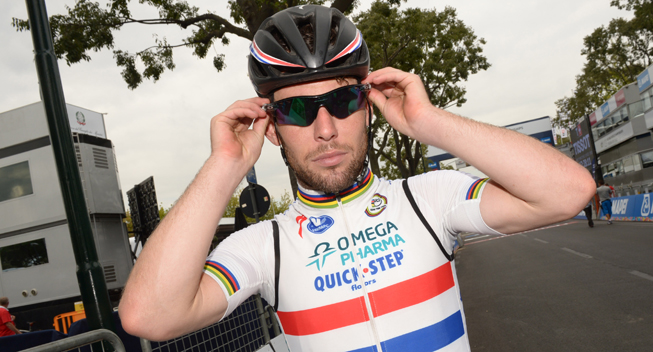Mark Cavendish saw himself relegated to the role of secondary sprinter in the Tour de France when Marcel Kittel's four stage victories put the German on top of the sprint hierarchy. In an interview with The Telegraph, Cavendish admits that his position as the fastest sprinter is under threat but claims to be motivated by the challenge of keeping it.
Mark Cavendish has had the position of the world's fastest sprinter since he won 4 stages of the 2008 Tour de France. In 2009, he was virtually unbeatable when he took no less than 6 victories in the world's biggest bike race, in both 2010 and 2011 he added another 5 and in 2012 when he was mostly left to fend for himself in the sprint finales, he still managed to win three stages.
In 2013 he had the lowest number of Tour stage wins since he opened his account 5 years ago. Seeing Marcel Kittel winning four stages, Cavendish only managed to win twice and one of those wins didn't even come from a bunch sprint. With Andre Greipel also breathing down his neck and Peter Sagan having claimed two consecutive green jerseys - albeit by virtue of more versatile skills than those of a traditional sprinter - Cavendish's reign is clearly under threat.
His close friend and sports director Brian Holm has said that Cavendish is better when he is angry. While the Brit can't completely confirm the suggestion, he claims to be extremely motivated by the fact that his position is challenged.
“To an extent," he told The Telegraph when asked about Holm's assessment. "Not so much angry: I’ve really learnt to control anger, it’s a waste of energy. But when I’ve got a point to prove, that will still be the case. I’ve been relatively unchallenged until now, and now people are challenging my position as the most dominant sprinter in the world.
“My stepson, if he can’t do something, he just says ‘I’m not doing it’. I was the exact opposite. If I couldn’t do anything, I had to do it.”
At 28, Cavendish is now one of the senior sprinters compared to riders like Kittel and Sagan. He admits that he can feel a difference in his sprinting compared to when he emerged as a sprint star.
“I feel that I’m getting older,” Cavendish says. “I don’t have the punch. I have to work on my sprint now, which I didn’t have to do before.”
While Cavendish is clearly a fast sprinter, he is also an intelligent one. He claims that his wins are as much due to his mental approach as they are a result of his physical abilities.
He even trains his mind by doing puzzles on his iPad.
“For me, it’s like a calculation, a series of movements, a series of chess moves," he said. "Not thinking, not having to react. Just reacting. By the time we start the sprint, my heart rate is probably 20 or 30 beats slower than the other guys. So many cyclists train their bodies. They don’t train their mind. I constantly do puzzle books. Smash through them. My iPad’s full of them. Logic puzzles. Bridges. Slitherlink.”
He admits to have a photographic memory that allows him to absorb his surroundings extraordinarily well.
“If I do a circuit, then after three laps I could tell you where all the potholes were," he claimed.
Despite his less successful Tour de France, Cavendish still managed to win 18 races in 2013, among them five stages in the Giro d'Italia.
| Fabian HOLZMEIER 37 years | today |
| Andrew ROCHE 53 years | today |
| Inez BEIJER 29 years | today |
| Rolando AMARGO 28 years | today |
| Miriam ROMEI 29 years | today |
© CyclingQuotes.com









